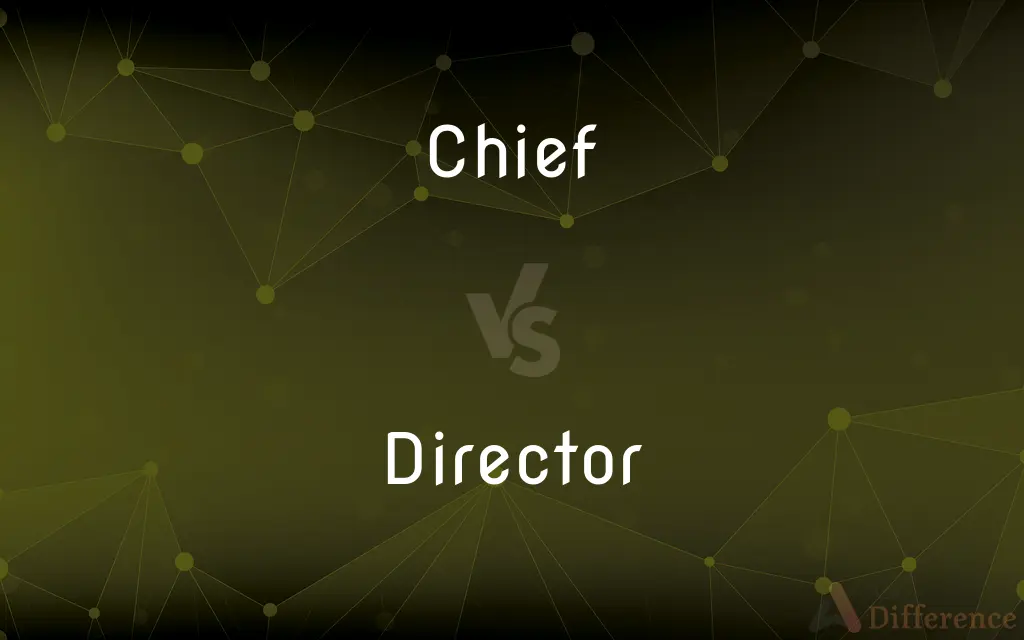Chief vs. Director — What's the Difference?
Edited by Tayyaba Rehman — By Maham Liaqat — Updated on March 20, 2024
Chief often refers to a top-ranking position or person in charge, emphasizing leadership or authority. Director typically denotes someone responsible for overseeing specific departments or projects, focusing on management within defined areas.

Difference Between Chief and Director
Table of Contents
ADVERTISEMENT
Key Differences
Chief positions are generally at the apex of an organizational hierarchy, holding ultimate responsibility for strategic decisions and leadership. Directors, on the other hand, usually oversee specific departments, projects, or aspects of an organization.
In terms of hierarchy, chiefs are at the top, setting the strategic direction and making high-level decisions that affect the entire organization. Directors, while also in leadership positions, operate within a more defined scope, focusing on the management and operational aspects of specific departments or projects.
The decision-making scope also differs between the two roles. Chiefs make broad, impactful decisions that set the course for the entire organization, while directors focus on decisions that affect their particular area of responsibility, aligning their actions with the overall strategy set by the chiefs.
The level of authority and scope of responsibility are key differentiators between chiefs and directors. Chiefs have a wider range of authority, encompassing the entire organization, whereas directors have authority within specific areas, tasked with operationalizing the strategic vision into practical outcomes.
Comparison Chart
Hierarchy Level
Top-most in the organization
Below chiefs, overseeing specific areas
ADVERTISEMENT
Scope
Broad, organizational-wide leadership
Focused, departmental or project-specific
Responsibilities
Strategic direction, overall vision
Managing teams, executing strategies
Decision Making
High-level, impactful decisions
Specific to department or project needs
Authority
Organization-wide
Within defined areas or responsibilities
Compare with Definitions
Chief
Head of an organization.
The chief greeted the new employees during orientation.
Director
Oversees specific departments.
The director of marketing launched the new campaign.
Chief
Person in charge.
As the chief, she had the final say in the hiring process.
Director
Implements strategies within areas.
The director of operations introduced new processes to improve workflow.
Chief
Top-ranking official.
The chief of the company announced a new strategic direction.
Director
Leader within a defined scope.
The director ensured the team met its quarterly goals.
Chief
Primary authority.
The fire chief coordinated the emergency response.
Director
Responsible for project management.
As the project director, he set the timelines and milestones.
Chief
Main leader.
The tribe’s chief led the negotiations.
Director
Manages resources and teams.
The finance director optimized the budget for better efficiency.
Chief
A leader or ruler of a people or clan
Chief Banawi
The chief of the village
Director
One that supervises, controls, or manages.
Chief
An ordinary consisting of a broad horizontal band across the top of the shield.
Director
A member of a group of persons chosen to control or govern the affairs of an institution or corporation.
Chief
Most important
Chief among her concerns is working alone at night
The chief reason for the spending cuts
Director
A person who supervises the creative aspects of a dramatic production or film and instructs the actors and crew.
Chief
One who is highest in rank or authority; a leader.
Director
The conductor of an orchestra or chorus.
Chief
A chief petty officer.
Director
An electronic device that continually calculates and displays information used for firing weapons at moving targets, such as missiles or aircraft.
Chief
(Nautical) The chief engineer of a ship.
Director
One who directs; the person in charge of managing a department or directorate (e.g., director of engineering), project, or production (as in a show or film, e.g., film director).
Chief
(Slang) A supervisor; a boss.
Director
A member of a board of directors.
Chief
(Heraldry) The upper section of a shield.
Director
A counselor, confessor, or spiritual guide.
Chief
Highest in rank, authority, or office
The chief scientist in the lab.
Director
That which directs or orientates something.
Chief
Most important or influential
The chief ingredients in the stew. See Usage Note at absolute.
Director
(military) A device that displays graphical information concerning the targets of a weapons system in real time.
Chief
A leader or head of a group of people, organisation, etc.
All firefighters report to the fire chief.
Director
(chemistry) The common axis of symmetry of the molecules of a liquid crystal.
Chief
(heraldry) The top part of a shield or escutcheon; more specifically, an ordinary consisting of the upper part of the field cut off by a horizontal line, generally occupying the top third.
Director
One who, or that which, directs; one who regulates, guides, or orders; a manager or superintendent.
In all affairs thou sole director.
Chief
The principal part or top of anything.
Director
One of a body of persons appointed to manage the affairs of a company or corporation; as, the directors of a bank, insurance company, or railroad company.
What made directors cheat in South-Sea year?
Chief
An informal term of address.
Director
A part of a machine or instrument which directs its motion or action.
Chief
An informal term of address for a Native American or First Nations man.
Director
A slender grooved instrument upon which a knife is made to slide when it is wished to limit the extent of motion of the latter, or prevent its injuring the parts beneath.
Chief
Primary; principal.
Negligence was the chief cause of the disaster.
Director
Someone who controls resources and expenditures
Chief
(Scotland) Intimate, friendly.
Director
Member of a board of directors
Chief
To smoke cannabis.
Director
Someone who supervises the actors and directs the action in the production of a show
Chief
The head or leader of any body of men; a commander, as of an army; a head man, as of a tribe, clan, or family; a person in authority who directs the work of others; the principal actor or agent.
Director
The person who leads a musical group
Chief
The principal part; the most valuable portion.
The chief of the things which should be utterly destroyed.
Chief
The upper third part of the field. It is supposed to be composed of the dexter, sinister, and middle chiefs.
Chief
Highest in office or rank; principal; head.
Chief
Principal or most eminent in any quality or action; most distinguished; having most influence; taking the lead; most important; as, the chief topic of conversation; the chief interest of man.
Chief
Very intimate, near, or close.
A whisperer separateth chief friends.
Chief
A person who is in charge;
The head of the whole operation
Chief
A person who exercises control over workers;
If you want to leave early you have to ask the foreman
Chief
Most important element;
The chief aim of living
The main doors were of solid glass
The principal rivers of America
The principal example
Policemen were primary targets
Common Curiosities
Which role has more decision-making power, a chief or a director?
Chiefs have more decision-making power, affecting the entire organization, while directors' decisions are confined to their specific areas of responsibility.
Can a director become a chief?
Yes, with enough experience and proven leadership, a director can be promoted to a chief position, such as CEO or CTO.
Do chiefs and directors work together?
Absolutely, directors often report to chiefs and collaborate to ensure strategic alignment and operational efficiency across the organization.
What qualifications are needed for a chief position?
Chiefs typically require extensive experience in their field, proven leadership abilities, and often advanced degrees in business or their specific area of expertise.
How do the responsibilities of a chief and director differ?
Chiefs are responsible for setting the organization’s strategic direction, while directors manage the execution of strategies within their specific departments or projects.
Are there specific industries where the terms chief and director are used differently?
The basic distinctions remain consistent across industries, though the specific responsibilities might vary based on the nature of the business.
Is a director part of the executive team?
Directors are often considered part of the senior management team, but whether they are part of the executive team can vary depending on the organization’s structure.
What is the main difference between a chief and a director?
The main difference lies in their level of authority and scope, with chiefs having broader organizational responsibilities and directors focusing on specific departments or projects.
Is a director a high-level position?
Yes, it is a senior management role, responsible for significant aspects of an organization's operations, though it is one level below chief positions.
How important is collaboration between chiefs and directors?
Collaboration is crucial for ensuring that the organization’s strategy is implemented effectively across all departments and projects.
Do all companies have chiefs and directors?
Most medium to large organizations have both roles, but the titles and structures can vary widely.
How does the role of a director contribute to an organization’s success?
Directors ensure the strategic plans set by chiefs are effectively implemented, managing resources and leading teams within their domains to achieve objectives.
Can a small organization have both chiefs and directors?
Yes, but in smaller organizations, the roles may overlap more, with fewer layers of hierarchy between them.
What is the typical career path to become a chief?
It usually involves progressing through various leadership roles, gaining extensive industry experience, and demonstrating strategic vision and leadership skills.
How do chiefs influence organizational culture?
Chiefs play a key role in shaping the values, vision, and culture of an organization through their leadership and strategic decisions.
Share Your Discovery

Previous Comparison
Treator vs. Traitor
Next Comparison
Usability vs. FunctionalityAuthor Spotlight
Written by
Maham LiaqatEdited by
Tayyaba RehmanTayyaba Rehman is a distinguished writer, currently serving as a primary contributor to askdifference.com. As a researcher in semantics and etymology, Tayyaba's passion for the complexity of languages and their distinctions has found a perfect home on the platform. Tayyaba delves into the intricacies of language, distinguishing between commonly confused words and phrases, thereby providing clarity for readers worldwide.
















































